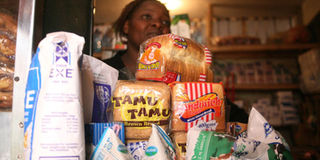Milk, book prices set to rise under VAT Act 2013

Some of the basic commodities that the value added tax (VAT) bill proposes a 16% tax taken on June 13 2013. PHOTO/FILE
What you need to know:
- Cost of electricity, smart-phones, cooking gas would also go up as the Treasury imposes 16 per cent tax in a new law
- Imposition of the consumption tax expected to come as a surprise to many consumers who thought Treasury dropped it
Milk will cost at least Sh14 more per litre from next month.
This follows President Uhuru Kenyatta’s assent to a Bill that introduces tax on dairy products.
Cooking gas, electricity, exercise books, text books and mobile phones also attract a 16 per cent tax charge under the new VAT law. Their prices are expected to rise by a similar margin.
The goods were previously zero-rated.
Under the current VAT law, electricity to homes consuming less than 200 kilowatt hours (kwh) was tax exempt while those using over 200kwh a month were charged 12 per cent VAT.
All consumers will pay more from next month as the new law has imposed a 16 per cent tax on all electricity consumption.
Also attracting 16 per cent tax are fertilisers, farm chemicals, computer hardware and software. The tax is expected to come as a surprise to many consumers who thought that the tax had been dropped after Parliament’s loud opposition.
The new law could be gazetted as early as next week.
The Bill was debated and hurriedly passed on the night of 6 August 2013 before lawmakers went on a month’s recess. The President signed it last Wednesday.
FUEL MILK HAWKING
Dairy processors promised to pass any additional cost from the new tax to consumers. Only unprocessed or raw milk is tax-free. Processed milks — pasteurised, maziwa lala, long life, yoghurt, milk powder, butter, cheese and ghee are in the tax bracket.
New KCC chief executive Kipkirui arap Lang’at expects the tax to slow down the sale of processed dairy products, push low-income households from the formal milk market and fuel milk hawking.
“This burden will be borne by consumers. Higher milk prices will see many consumers stop taking milk or cut consumption, negatively affecting growth of the dairy industry,” said Dr Lang’at in an interview.
A 500ml packet of milk currently retailing at Sh45 could cost about Sh52 from next month.
The new VAT law drastically scales down the number of zero-rated and tax-exempt goods from over 400 to about 100.
Treasury Secretary Henry Rotich has said that the government plans to raise Sh10 billion annually from the tax in the new law.
“The cost of living will go up considerably,” said John Thindi, a tax director at PKF East Africa.
“The tax measures on farm inputs will lead to increases in food prices.”
The rise in fertiliser and pesticides costs comes after a 1.5 per cent levy was imposed on all imports to fund the construction of a standard gauge railway line between Mombasa and Kigali.
Parliament defended its decision to include the essential goods in the list of VAT taxable commodities saying ‘basic goods’ was a relative term.
“The goal was to reduce the complications in implementing the previous law,” said Benjamin Langat, who chairs the parliamentary committee on Finance, Planning and Trade.
He said they expected the government to use the tax revenues to help the poor.
The new law exempts fuel and oils from VAT for three years after which they will automatically pay the 16 per cent tax.
Mobile phone makers have said they would increase handset prices by 16 per cent and they fear this will hamper the transition from feature phones to smartphones.
“Higher mobile phone prices will act as a barrier and lead to slower penetration growth,” said Jussi Hinkkanen, Nokia vice-president in charge of corporate relations in India, the Middle East and Africa.
He said it offers short-term revenues for the government but in the long-run, tax that would have been generated from accelerated economic growth will be lost.
For example, the price of an entry-level smartphone such as the Ideos Ascend Y-100, which currently retails at Sh5,999, will go up by Sh960 to Sh6,959.
During his tenure as Finance minister, Mr Kenyatta exempted mobile phones from VAT in the 2009 budget, as a strategy to deepen use of mobile phones and mobile money, m-commerce and apps development.
After the tax break, Kenya’s mobile subscribers almost doubled to 29.8 million as at March this year from 17.4 million in June 2009, data from the Communications Commission of Kenya show.
A July study by Ipsos Synovate showed that Kenyans are opposed to VAT on essential goods.
Nine out of every 10 Kenyans said they were against VAT on basics such as milk, exercise books, cooking gas and electricity. They argued the tax will increase the cost of living and hurt the majority poor.
This story was first published by the Business Daily.




